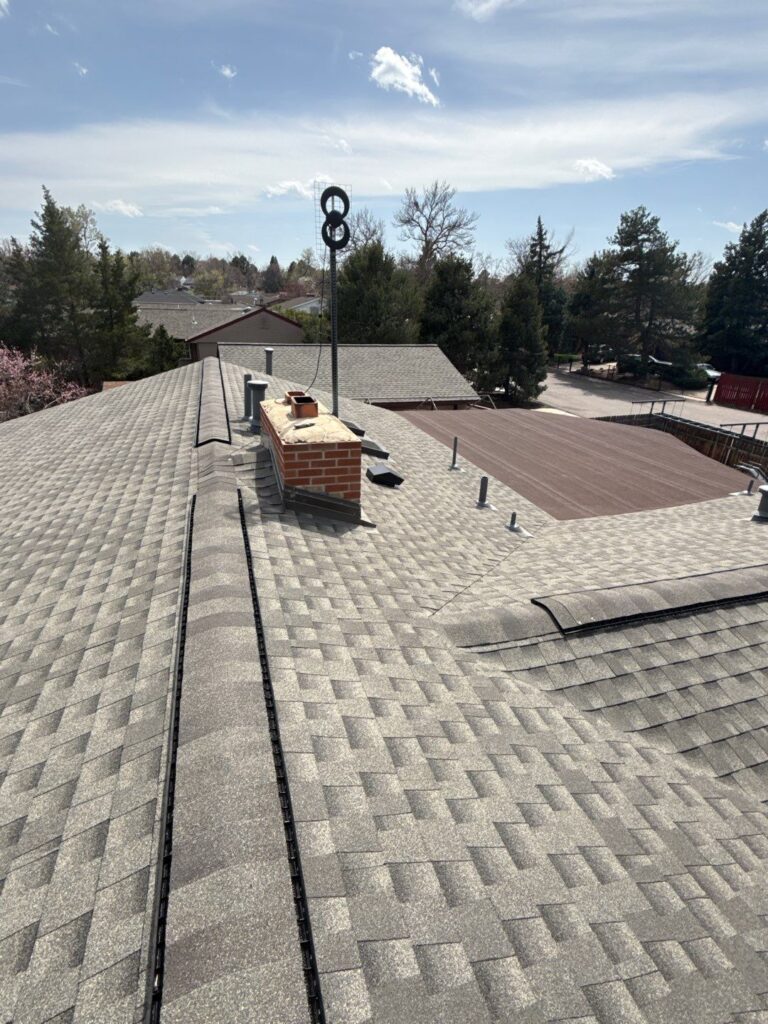In the dynamic climate of Denver, Colorado, having a sound understanding of roofing terminology is crucial for homeowners seeking to maintain their properties and collaborate effectively with roofing contractors. This guide provides an in-depth breakdown of the most common roofing terms, helping you make informed decisions when it comes to roofing in Denver.
Anatomy of a Roof: Core Roofing Components
Roof Decking (Sheathing)
Roof decking is the structural base of your roof, usually made from plywood or oriented strand board (OSB). It provides a foundation for all roofing materials. Properly installed and maintained decking is essential for roofing in Denver due to snow loads and extreme weather shifts.
Underlayment
The underlayment is a protective water-resistant barrier installed between the decking and the roofing material. It adds an extra layer of protection against moisture intrusion, especially important for roof repairs in Denver, CO, where snow and rain are common.
Shingles
Shingles are the outermost layer of the roof, directly exposed to environmental elements. Popular shingle types include:
- Asphalt Shingles: Cost-effective and durable, ideal for Denver’s fluctuating temperatures.
- Metal Shingles: Resistant to hail and wind damage, suitable for roofing repair in Denver.
- Slate and Tile Shingles: Long-lasting but heavier, requiring stronger support structures.
Roofing Structures and Features: Key Terms
Flashing
Flashing refers to thin metal strips installed at joints and roof penetrations (chimneys, skylights, vents) to prevent water infiltration. Denver roofing companies emphasize flashing in areas prone to snow accumulation.
Fascia
Fascia boards run along the roof’s edge, supporting the lower edge of the roof and gutters. They protect the home from water damage and are often exposed to harsh weather in Denver.
Soffit
The soffit is the underside area of the roof overhang. Proper ventilation of the soffit is essential to regulate attic temperature and prevent ice dams in Denver’s winters.
Ridge
The ridge is the highest point of a roof where two sloped planes meet. A ridge vent installed along this line promotes attic ventilation.
Roof Ventilation and Insulation: Vital for Denver Homes
Ridge Vent
A ridge vent runs along the peak of the roof, allowing hot, moist air to escape from the attic. This is critical for preventing mold growth and reducing cooling costs in the summer.
Soffit Vent
Installed under the eaves, soffit vents allow fresh air to flow into the attic space, balancing the temperature and reducing condensation.
Insulation
Effective insulation keeps your home warm in Denver’s frigid winters and cool during hot summers. Roofing contractors in Denver, Colorado, often recommend high R-value insulation materials for optimal energy efficiency.
Roof Shapes and Styles
Gable Roof
A gable roof has two sloping sides that form a triangular shape. It’s common in Denver homes due to its simple design and excellent water drainage capabilities.
Hip Roof
A hip roof has slopes on all four sides, providing added stability in windy conditions — ideal for homes in exposed Denver neighborhoods.
Flat Roof
Flat roofs are often used for commercial buildings but are also seen in modern Denver homes. They require specialized waterproofing materials and regular maintenance.
Roofing Materials Specific to Denver Climate
Asphalt Shingles
Asphalt shingles are the most common choice for roofers in Denver due to affordability, durability, and ease of installation.
Metal Roofing
Metal roofing is increasingly popular among Denver roofing companies for its longevity and resistance to hail and snow accumulation.
Modified Bitumen
Used primarily for flat roofs, modified bitumen offers excellent waterproofing and is recommended for roofing in Denver, Colorado, where ice and snow can pose challenges.
Roof Repair and Replacement: Signs to Watch For
Common Roofing Issues in Denver
- Cracked or curling shingles due to UV exposure.
- Ice dam formation from poor ventilation.
- Water stains or leaks inside the attic.
- Sagging rooflines from snow loads.
When to Call a Roofing Contractor in Denver
If you notice missing shingles, water damage, or visible structural issues, contact a reputable roofing company in Denver for an inspection and potential repair or replacement.
Roofing Services in Denver: Working with Professionals
We recommend homeowners in Denver work with trusted roofing companies that understand local weather challenges and building codes. Tried and True Roofing, a leading Denver roofing company, offers expert roofing services tailored to the unique needs of Denver, Colorado homeowners.
Conclusion
Understanding essential roofing terms empowers homeowners to protect their property investments and communicate effectively with roofing contractors in Denver. From roof decking to insulation, knowing the terminology enhances your ability to maintain a resilient, weather-resistant roof. When seeking roofing services in Denver, always consult experienced Denver roofers who specialize in roof repairs, replacements, and installations suitable for Colorado’s demanding climate.


